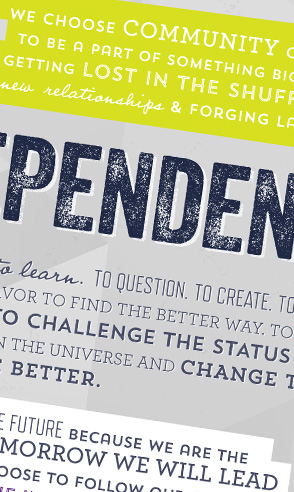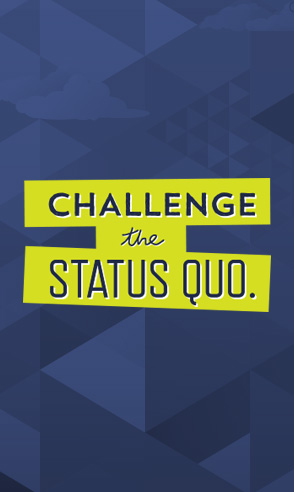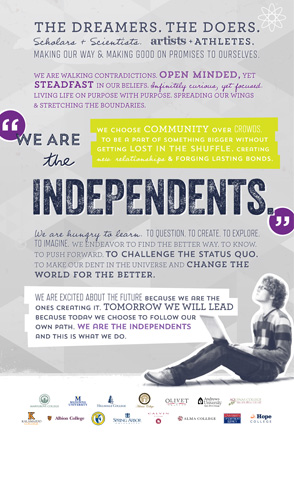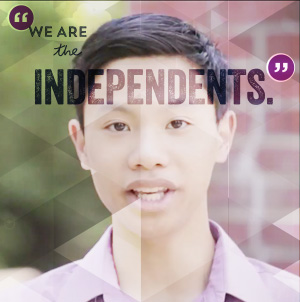Archive for
Seven Tips for your Best College Interview
Originally posted at https://www.hillsdale.edu/hillsdale-blog/after-hillsdale/seventipsforyourbestcollegeinterview/.
Written by Kelly Kane.
Distinguishing yourself from other applicants is an important consideration when preparing your college applications. How best can you position yourself for admission and even scholarship? Meeting deadlines and submitting strong application materials are a part of the answer, but optional items like the college interview can be equally important.
Interviews are not required for admission to Hillsdale College, but they are strongly recommended. An interview can help to strengthen your application—and your competitive edge for admission and scholarship. Its purpose is evaluative and informative, allowing both parties to learn more about one another.
Whether you’re intimidated or excited by the prospect of an interview, here are Hillsdale College admissions rep Kelly Kane’s seven tips to help you succeed, informed by more than six years of admissions experience (and lots of interviews):
- Make a good first impression. Arriving a few minutes early will allow you the time to find where you need to be and have a moment’s rest to put your mind at ease before beginning. If for any reason you will be tardy or need to miss your appointment, be sure to call ahead.
- Remember the interview is a conversation, not a test. You should plan to talk about things like your college search, academic work, extracurricular activities, goals for the future, and how Hillsdale might be a good fit. You are the expert on the subject of yourself, so feel confident you are well prepared to answer questions about your background, interests, experiences, and aspirations. We will not be asking you to solve a calculus equation or translate any epic poetry from the Greek during your interview, so no need to worry too much.
- Be ready to provide the “hows” and “whys” behind your answers—remember, we are looking to understand the you that is not already presented on paper. Why is Hillsdale part of your college search? How do you hope to grow during your years at Hillsdale? What is it you love about your favorite class? Be authentic and truthful. If your answers are only an effort to impress, you will struggle to explain yourself when pressed.
- Consider the length of your responses. Find the happy medium between something too brief and minutes-long monologues. Focus on the most relevant information you are looking to convey, and do so clearly.
- Avoid making assumptions. Try not to assume the interviewer necessarily agrees with your perspective. Be prepared to present an argument for your assertions, or to define your terms.
- Take the time you need to consider your answers. It is not impolite to take a short pause to organize your ideas before responding to a question: “I don’t know, I’ve never thought about that before. May I have a moment?” Taking the time to be thoughtful can be to your advantage, and help you avoid saying something you may later wish was said differently.
- Ask questions in return. In fact, prepare a list in advance of any questions you may have about Hillsdale. Demonstrate the sincerity of your interest in specific aspects of Hillsdale’s curriculum or community, or ask the interviewer for their experiences or advice.
Kelly shares, “I am often asked by prospective students how to best position themselves for earning admission or scholarship to Hillsdale, and the interview is always first on my list of recommendations. With campus, regional, and even virtual interview options available, I encourage you to not only take advantage of the opportunity, but with the benefit of these seven tips, to make the most of it.”
When choosing which colleges you’ll apply to, remember that Michigan’s top 14 independent colleges and universities set themselves apart from bigger public institutions by encouraging students to forge success by following their own path. The colleges are smaller and emphasize community over crowds. Often less expensive than public institutions, the independents boast higher four-year graduation rates and smaller class sizes for a truly unique and affordable experience.
Be bold. Be different. Go independent.
Make Your College Campus Visits, Virtually
While in-person admissions visits at Michigan’s top 14 private colleges and universities have been canceled due to the coronavirus pandemic, prospective students can still explore these beautiful campuses with the click of a button!
With virtual tours available, you can still get the chance to “walk” the campus, see and feel what life could be like for the next four years. The online tours not only give you a peak into each campus, but many schools even allow you to schedule an online information session with a live admissions counselor! Get your questions answered and make an informed choice now from the comfort of your home.
Get more information in the links below:
Alma College Virtual Tour | Schedule a Virtual Visit
Andrews University Virtual Tour | Sign up for a Virtual Preview
Aquinas College Virtual Tour | Schedule a Virtual Personal Visit
Calvin University Virtual Tour | Schedule a Virtual Visit
Hillsdale College Schedule a Virtual Visit
Hope College Virtual Tour | Schedule a Virtual Visit
Kalamazoo College Virtual Tour | Schedule a Virtual Visit
Madonna University Campus Tour Video | Schedule a Virtual Visit
Siena Heights University Virtual Tour
Spring Arbor University Virtual Tour | Schedule a Virtual Visit
University of Detroit Mercy Virtual Tour | Sign up for a Virtual Information Session
When is the best time to visit colleges?
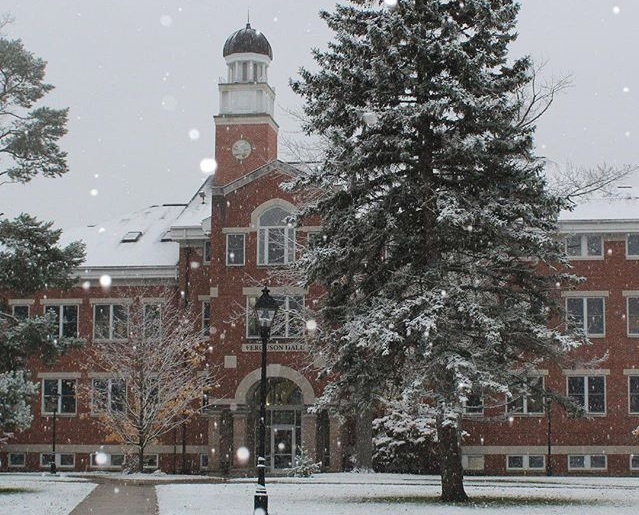
(Albion College, voted 12th Most Beautiful College in Winter)
It’s winter, and the tundra is setting in – at least it is here in Michigan. The last thing you are thinking about is planning a trip to visit campuses. Those long walks across snow-covered quads are certainly less appealing when the temperatures are teetering at the same level as the number of layers you’ll be wearing to stay warm. Or maybe you are a freshman or sophomore, and it’s just “not time yet.”
So, “When is the best time to visit?” The answer may not be what you expect. Here are some tips for getting the most out of campus visits:
Time of year:
As summer strolls in and the school year winds down, families across the country are gearing with plans to visit college campuses. Tours are crowded, staff is minimal, and quads are relatively barren. Although the summer months are more convenient for your time, ideally you should try to plan your visits when classes are in session and the campuses are full of life. Think of it like trying on a pair of new shoes: do you get the proper assessment while sitting? No, you get up, walk around, and perhaps jog in them… as it should also be done visiting campuses. Simulate the day-to-day as if you are attending the school. It doesn’t necessarily mean go in the dead of winter, but consider this: it may be cold, but it’ll also be cold while you attend, won’t it?
Age of student:
It can be very rewarding to visit colleges and universities before your junior and senior year (read: before it’s decision time). You are less concerned about choosing and “buying” when you are simply “window shopping” and more interested in checking out the inventory. Expose yourself to as many different kinds of places—big schools, small schools, research universities, liberal arts colleges, urban campuses, places way out in the country—to develop a broad perspective of all the different options. Then, when it is time to make a decision, you’ll have a better foundation on which to choose.
Before stepping foot on the first campus (and each one after that…):
Your new mantra: Relax, enjoy, decide later. Resist the impulse to judge immediately, good or bad. Your first reaction is bound to be emotional, and usually overly positive—college is really cool! Sleep on it. Weigh your impressions against the other schools you visit and try to remain as objective as possible so your rose-colored glasses don’t allow you to overlook things.
How to choose:
As you visit the campuses, allow your senses to guide you. Really like something? Take note of it. Feel like something’s missing? Take note of it. Gut instinct is usually pretty accurate. Additionally, the perceptions from your visits will come in handy when completing your college applications. Remember this: tying personal experience to the campus environment will blow the minds of the admissions department!
What to look for:
Focus on fit. We perform at our best when we have a level of comfort, belonging, and value. Questions to ask yourself: How does the college meet my academic needs? Will I be challenged appropriately? Is the style of instruction a good match for how I learn? Does the college offer a community that makes me feel “at home?” Does the college offer extracurricular activities that interest me?
After the visit, before you leave:
Connect with the recruiter. Colleges and universities typically assign admissions personnel to different areas of the country for recruiting efficiency. If your area’s recruiter is available, definitely introduce yourself. Either way, get that person’s contact information. Consider him/her as your “go to” person when you have important questions later in the admissions process. And remember this: there is nothing insignificant nor too embarrassing to ask. The admissions staff is there to help!
What to do next:
Record your visit. Make notes as soon as you are able. The more campuses you visit, the more they will begin to blend together, especially from memory. Take pictures to give yourself a visual index of what you’ve seen to avoid confusion later.
And finally:
Enjoy the process. It can be easy to get lost in the excitement and have that energy turn into anxiety. Relax. Start the search early. Visit during the school year to witness the campus’s true environment. Trust your senses and take notes.
As you map your college visit road trip, include a few of Michigan’s top 14 private colleges and universities on your list. These schools are purposefully smaller and emphasize “community over crowds.” Often comparable in cost to Michigan’s public institutions, the independents boast higher four-year graduation rates, outstanding faculty who help students forge their own paths, and smaller class sizes for a truly unique and personal experience.
Be bold. Be different. Go independent.
Your One-Stop, College Admissions Connection: Virtual College Fair
We’ve said it before. The best way to choose your own path is to visit a college campus… or three. Breathe the air. Wander the student center. Sit in on a lecture. Chat up a few professors. Grab a meal in the dining hall. Stroll through the quad.
But the college search doesn’t usually start with a visit to campus. You might begin by looking at websites or admissions booklets, or attending a college fair to learn more. Pixels and pages are a start, but nothing beats talking to a person, and college fairs can be time consuming to attend. Now, there’s a solution!
Enter the Virtual College Fair. It’s never been easier to connect with a college admissions office and get your big questions answered.
The Virtual College Fair offers free access to video recordings and live streams from Michigan’s top private colleges and universities. Watch the recordings, pick your favorites (or pick them all!), and then register – individually or with your family – to attend a live and interactive web-based Q&A session with admissions and other college representatives. Learn more here.
Like what you hear? Reach out to the college to continue the conversation and maybe even schedule a visit!
Upcoming Live Q&A Sessions
December 4, 2018 at 7 PM: Alma College
December 4, 2018 at 8 PM: Aquinas College
December 5 , 2018 at 7 PM: Madonna University
December 6, 2018 at 7 PM: University of Detroit Mercy
December 6, 2018 at 8 PM: Calvin College
December 11, 2018 at 7 PM: Albion College
December 12, 2018 at 7 PM: Spring Arbor University
December 13, 2018 at 7 PM: Hillsdale College
Michigan Colleges Alliance Awards $32,500 as Part of Independent InnovatorsNetwork Scholarship
Michigan Colleges Alliance (MCA), an organization made up of 14 independent colleges and universities across Michigan, has recently awarded $32,500 in scholarships to six recipients through its Independent InnovatorsNetwork. Recipients consisted of students from Hillsdale College, Aquinas College, Kalamazoo College, Spring Arbor University, and Albion College.
The Independent Innovators Network awards scholarships based on the strength of student applications outlining a business or social entrepreneurship concept. The program first received funding from the Council of Independent Colleges, ranking first among some 20 states competing for grant support in a national RFP.
The Independent Innovators Network, with national and statewide support, is quickly becoming a leading MCA initiative, positioning private, liberal arts students and graduates at the forefront of entrepreneurship and economic development in Michigan. Substantial funding for the program comes from The Jandernoa Foundation, Ford Motor Company Fund, Armstrong International, and Enterprise.
This is the third round of the scholarship competition. Any student attending one of the 14 member colleges and universities of Michigan Colleges Alliance can apply. The most recent competition received 25 applicants across 11 schools, and a total of six winners were awarded a scholarship for their innovative ideas. Scholarships awarded ranged from $2,500 to $7,500. Scholarships through the Independent Innovative Network vary and are given based on multiple factors. Funding, the number of submissions and quality of submissions affect the number of recipients and the amounts given. A steering committee of business leaders ultimately decides how the scholarships are awarded.
Recipients of the award were not the only ones who received an award. Faculty who sponsored winning students also received a $500 stipend for helping mentor and encourage students.
Michigan Colleges Alliance represents 14 independent colleges and universities throughout Michigan, and works to develop collective initiatives that produce positive student outcomes.
As part of its We Are The Independent’s collective promotional campaign, MCA launched the Independent Innovators Network to encourage students at its 14 member colleges and universities to be independent and to follow their own path. The program gives students at smaller schools the unique opportunity to create a culture of entrepreneurship within Michigan higher education, and to stimulate a flow of new product and business ideas in Michigan. The program supports MCA’s overall goal to align the preparation of its graduates with the future skills, qualities, and experiences needed for Michigan’s continued economic progress and success.
“The Independent Innovators Scholarship competition is one of many ways MCA cultivates college educated talent for our state and nation,” says MCA President Dr. Robert Bartlett. “Collectively, our members represent Michigan’s “third largest university,” with more than 41,000 students. This program gives students in all majors the opportunity to think, collaborate, and explore their futures as entrepreneurs.”
All entries are reviewed by MCA board members, scholarship donors, and representatives from partner entrepreneurial organizations across the state. This year’s review panel included representatives from Steelcase, Ford Motor Company, PVS Chemicals, ASG Renaissance, as well as MCA faculty.
The program plans to host the next round of the scholarship competition in fall 2018
Hillsdale College Proud to Go Its Own Way
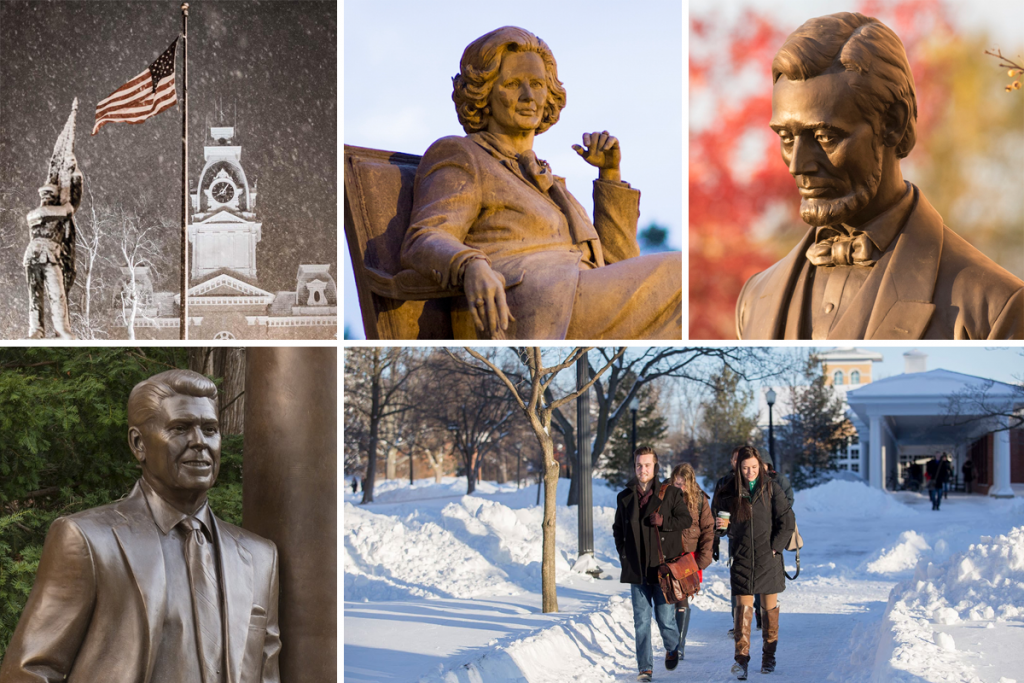
Quick: Name a college with statues of not only Abraham Lincoln but also Ronald Reagan and Margaret Thatcher.
Or one with free online courses that teach the U.S. Constitution? That refuses to accept federal funding.
It can only be one: Hillsdale College, the so-called “shining city on the hill” for political conservatives, who unabashedly revere the founding fathers and don’t apologize for a core curriculum that revolves around books by so-called Dead White Men.
Tucked away in central Michigan, the school is attracting attention yet again in the first few weeks of President Donald J. Trump’s administration. The New York Times and others are shining a light on the Michigan jewel in part because it underscores the debate within conservative intellectual circles about what to make of Trump.
Proudly different, Hillsdale attracts students from throughout the country because it provides world-class education at a bargain. Even though it eschews federal money — making students ineligible for Pell grants — 95 percent of its students received grants of more than $17,000 this year, dramatically lowering its advertised $35,000 cost of tuition, room and board.
The education is without parallel. Unlike other schools that seem ashamed of teaching liberal arts, Hillsdale embraces it. For two years, students study the classics, taking more than a dozen mandatory classes on topics from western heritage, American heritage, biology and chemistry.
The classes help students forge tight bonds with faculty and administrators. Heck, the New York Times noted the school president, Larry P. Arnn, “has been known to swoop down on hapless victims in the cafeteria and pose the core question of the Classics: “What is The Good?”
Is it for everyone? Perhaps not. But what makes Hillsdale awesome is that, in this day of trying to please everyone, it’s proudly unique and charts its own path.
That’s something of a specialty at Hillsdale College and Michigan’s 15 independent colleges and universities.
Proudly small, their students don’t get lost in the crowd like those at big state schools. And unlike public universities, students actually graduate in four years, not only saving a year of tuition but also giving them an extra year of earnings in their careers.
They have a deep and committed network of alumni who help after graduation. It’s an experience that simply isn’t available at traditional universities.
Be bold. Be different. Go independent.
Love “A Christmas Story”? Thank Hillsdale College
Merry Christmas! You’ll shoot your eye out.
You don’t need to own a Red Ryder, carbine action, 200-shot range model air rifle to know the line is from “A Christmas Story,” the 1983 movie that’s become a staple of the holidays. Played on constant rotation starting Christmas Eve, the movie is so quotable that most know its dialogue by heart.
Fra-GEE-leh! It must be Italian!
I double DOG dare you.
It’s a pink nightmare.
Less well known is the genius behind the classic is one of Hillsdale College’s own, director and co-writer Bob Clark. He attended the Michigan college in the 1960s on a football scholarship and starred in several productions of the Tower Players.
Clark also directed another, less family friendly classic, “Porky’s,” during a career that spanned four decades and began shortly after he left Hillsdale in 1963. He got his start directing zombie flicks and eventually helmed productions including Jack Lemmon, Sylvester Stalone and some of the biggest Hollywood stars.
But he’ll forever be known for “A Christmas Story,” a project he loved so much he forsook his salary.
The inspiration struck when he was on a bad date and listened to a broadcast of writer Jean Shepherd’s recollections about growing up in Indiana in the 1930s and 1940s. He ended up driving around the block until the program was over.
“My date was not happy,” Clark said in an interview.
Clark is one of many creative luminaries who got their start at Michigan’s top 14 independent colleges and universities. The schools pride themselves on attracting students who do things differently and pairing them with dedicated faculty who help chart their own path.
So it’s probably no surprise the schools’ alums include diverse talent from singer Sufjan Stevens (Hope College) and funnyman Keegan Michael Key (University of Detroit-Mercy) to Martin Scorsese collaborator Paul Schrader (Calvin University) and “Walking Dead” star Steven Yeun (Kalamazoo College.)
All the schools emphasize community over crowds and help students forge their own paths.
It’s an experience that simply doesn’t exist at big state schools.
And despite what you may have heard, independents are often less expensive and boast higher four-year graduation rates that big universities.
Be bold. Be different. Go independent.
Kalamazoo Promise Makes Private Education Within Reach
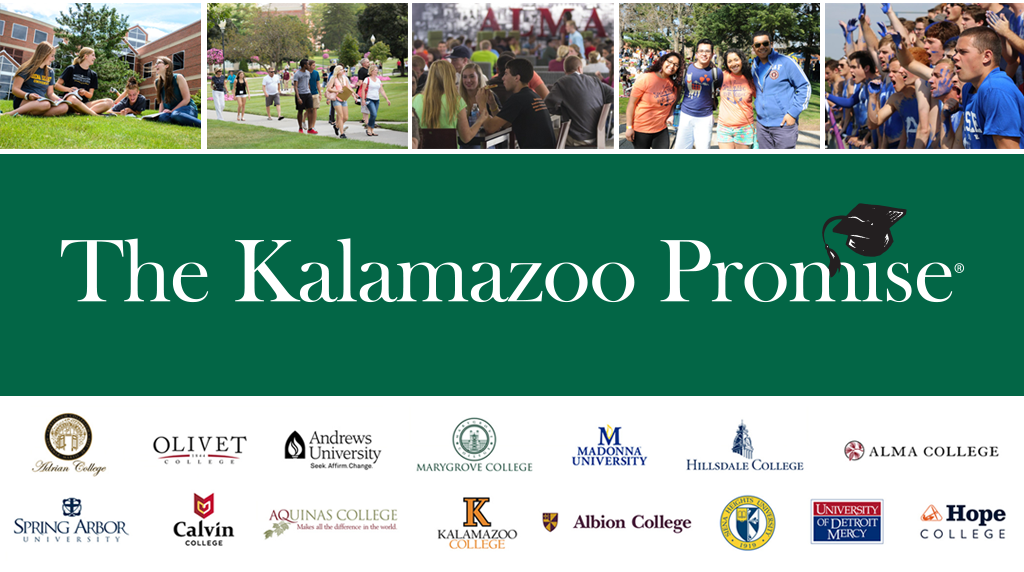
Almost everyone nowadays can cite scary statistics when it comes to the cost of college education.
Nationwide, the average annual tuition at private schools has more than tripled in 30 years jumping to $32,405 this year, according to inflation-adjusted statistics from the College Board.
But the cost of an elite private school education is nothing for students in Kalamazoo public schools.
You read that right.
The cost of Michigan’s 15 independent colleges and universities is zero for students who graduated from Kalamazoo Public Schools and attended since kindergarten. Graduates who attended since at least seventh grade will receive 75 percent of their tuition.
The Kalamazoo Promise is a revolutionary program that is changing lives and putting college in reach for 5,000 eligible graduates since it was launched and funded by anonymous donors in 2005.
The schools now send 85 percent of students to college, whose graduates can expect to earn $1 million more over their lifetime than peers whose education stopped at high school.
And what an education they can get, especially at Michigan’s independents: Adrian College, Albion College, Alma College, Aquinas College, Calvin College, Hillsdale College, Hope College, Kalamazoo College, Marygrove College, Olivet College, the University of Detroit Mercy, Andrews University, Madonna University, Siena Heights University and Spring Arbor University.
The schools pride themselves on helping students forge their own path. Classes are taught by professors, not teaching assistants, with average class sizes of just 17.5 students.
The independents open doors to a host of careers, from business and engineering to education and nursing, supported by a nurturing network of alumni who have become leaders in their fields.
And the independent colleges look like the world around them. One in 4 students at Michigan private colleges and universities is African American, American Indian, Asian, Hispanic or Latino.
Be bold. Be different. Go independent.
Holidays are About Tradition at Michigan’s Top 15 Independent Colleges
Holidays are all about tradition. And big state schools certainly have their own. Unfortunately, they often go something like this: Cram for finals, throw dirty clothes in a bag and say hurried goodbyes to your dorm mates before hopping in a car and leaving town.
Michigan’s independent colleges and universities do things a bit different. And they’re proud of that. Built around community and cohesion, the schools embrace all the wonder and tradition the holiday season has to offer, from choir concerts and campus sing-alongs to tree decorating parties.
At Hope College, students and community members have gathered for eight decades for Christmas Vespers. The first event was held just hours before the Japanese bombed Pearl Harbor on Dec. 7, 1941, and held every year since. That first year, 500 people came. It’s grown every year since to the point where people start inquiring in August about tickets for the choir and symphony concert.
For more than 40 years, Albion College has gathered for the Festival of Lessons and Carols, which features several choirs and intersperses carols with readings that trace Biblical history. For decades, the popular event has begun with “Once in Royal David’s City” and ended with a candlelit rendition of “Silent Night.”
For 22 years, Alma College’s Festival of Carols gathers 110 members of the Glee Club, College Chorale and Alma Choir for carols and candle lighting to commemorate both Christmas and Hanukkah.
Spring Arbor University’s Hanging of Greens has brought the campus and community together for 15 years, with an event that includes caroling, tree-lighting, hot chocolate and horse carriage rides.
A new tradition continues at the University of Detroit-Mercy, which produced a live version of holiday classic “It’s a Wonderful Life” for the second time this month. The twist is the play is produced as a radio show, featuring a handful of actors playing dozens of characters in the Frank Capra classic before a live audience.
At Aquinas College, the college gathers every year to light a Christmas tree that was planted in 2010 by the Student Senate to reflect the school’s commitment to the environment.
Sound like a lot? We’re just getting started.
Kalamazoo College has celebrated BachFest Christmas, a concert of the famed composer, for every year since 1970. Calvin College has the Sleigh Ride Around the World, which combines Yuletide movies projected on the big screen with Christmas classics from the college’s Wind Ensemble.
We could go on and on.
Adrian College organizes a campus wide party. Marygrove University, Siena Heights and Olivet College host a Christmas concert. Andrews University has a tree-lighting and Christmas concert.
Madonna University puts on the “Christmas Carol” play. Hillsdale College has both a concert and annual Christmas video from its president.
Some of the events may seem similar, but what makes them different – and so special – is that they’ve become part of the fabric of the individual communities around them.
That’s because Michigan’s 15 independent colleges and universities are enmeshed in their cities and towns and realize that college is about experience almost as much as it is about learning.
National leaders in education, the schools emphasize community over crowds and a spirit of togetherness and cohesion that just doesn’t exist at big state schools.
With low class sizes and award-winning faculty, the schools are proud that students forge lifelong bonds with professors.
Often less expensive than public institutions, the independents boast higher four-year graduation rates for a truly unique and affordable experience.
Be bold. Be different. Go independent.
Hillsdale College Proves Again Traditional Education Equals Real-World Success
A funny thing happened when national test results were announced this month to become certified accountants.
Hillsdale College finished in the top 3 percent, ranking 22nd out of 776 schools whose recent graduates took the United Certified Public Accountants exam.
It’s kind of a big deal. Because Hillsdale doesn’t hide from the fact that it’s a classic liberal arts school, providing students with a well-rounded education in western civilization and great books rather than training them for a job.
“Anyone who questions the value of a liberal arts education should look at the students graduating from Hillsdale,” said David Whalen, Hillsdale College provost.
“These CPA exam results demonstrate the merits of our rigorous core curriculum and the students who rise to the challenge of it. When the liberal arts are taught well, students acquire deep learning as well as the ability to master demanding professional skills.”
More on that in a second. First, the results. Hillsdale students who study accounting and took the CPA test for the first time had a passing rate of 78 percent, with an average score of 81. That’s more than 31 percentage points ahead of the overall national pass rate of 49.5.
Now, about liberal arts. Among some schools, it’s not trendy to admit they teach liberal arts. Hillsdale is unabashed and unbowed about what it provides, standing firm in its commitment to traditional education despite the prevailing tide of conventional wisdom.
Now, the rest of the world has caught up. Study after study shows Fortune 500 companies, particularly the tech industry, prefer graduates of liberal arts schools.
That’s because the graduates not only learn valuable skills such as accounting — as the recent test results prove — but they learn how to think critically, ask questions and create.
It’s a novel concept and one embraced by Hillsdale College and Michigan’s top 14 independent colleges and universities.
The schools pride themselves on partnering award-winning faculty — who are experts in their fields — with students, forging tight bonds that allow them to chart their own path.
Class sizes are small. Community is cherished. Knowledge is king. It’s an experience that simply isn’t available at traditional universities. And despite what you may have heard, independents are often less expensive and boast higher four-year graduation rates than four-year institutions.
Be bold. Be different. Go independent.







